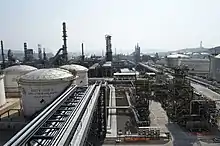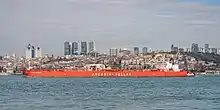
Oil supplies over a quarter of Turkey's energy.[1][2] Because the country produces very little oil,[3] it is almost completely dependent on imports of oil and oil products such as petrol and diesel,[4] over half of which is consumed in the country's road vehicles.[5] Turkey is the world's largest user of liquefied petroleum gas (LPG) for road transport.[6]
Because Turkey produces only 7% of the oil it consumes, the country’s total imports are worth more than its exports, which is a problem for its economy.[7] After the 2022 Russian invasion of Ukraine, several European countries stopped buying Russian oil, petrol and diesel but Turkey's relations with Russia are such it continues to buy all three.[8][9]
Demand
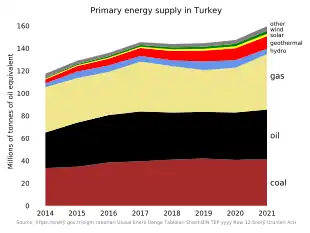
During the 2010s, demand for oil considerably increased, mainly due to increased use of diesel,[10] and is forecast to slowly increase until 2040.[11] Over half of Turkey's imported oil and oil products are used for road transport,[5] and Turkey is the world's largest user of liquefied petroleum gas (LPG) for road transport.[6] It is hoped the locally manufactured electric cars and other road vehicles from the country's automotive industry will eventually reduce the import bill.[12] In 2021, Turkey's consumption of diesel—both domestic and export—was over six times that of petrol.[13]: 19
Health and environmental impact
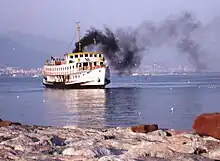
Fossil-fuelled road-vehicle exhaust emissions pollute large cities with nitrogen dioxide and other gasses.[14] Air pollution from diesel is worse than that from petrol.[15]
As of 2022 the Black Sea is not an emission control area; air pollution is emitted from ships in Turkish Black Sea ports.[16] Maritime incidents in the Turkish Straits have resulted in oil spills. Air pollution from ships burning heavy fuel oil near cities is a problem in some places, such as Mersin.[17]
Oil production in Russia causes methane leaks into the atmosphere.[18] Because the international greenhouse gas inventory standard is production-based, this is accounted for in Russia's greenhouse gas emissions rather than those of Turkey.[19]
Sources

Turkey's estimated reserves of oil is about 600 million barrels[lower-alpha 1],[13]: 19 and about 3 million tons are produced each year, about seven percent of Turkey's annual consumption.[20][21] The country imports around 25 to 30 million tons a year,[13]: 20 mostly from Russia and Iraq.[22][23]
TPAO, the state-owned exploration and production company, drills between 100 and 200 exploratory wells each year.[13]: 19 Most proven oil reserves and production are in Batman and Adıyaman Provinces in the southeast, and there is a little in Thrace.[24]: 3 Batı Raman has extra heavy crude oil; other fields produce much-lighter domestic crude, whose API gravity averages 28, and this medium-weight oil is suitable for the Turkish market.[25] In 2023, reserves of about one billion barrels with API gravity of 41 were discovered near Mt Gabar in Şirnak.[26] Shale oil may be extractable from Dadaş but well-waste fluids would need to be properly handled to minimize the environmental impact of hydraulic fracturing.[27]
Oil exploration licenses in Turkey are granted by the General Directorate of Mining and Petroleum Affairs[20] but the process of granting them takes a long time and requires political influence.[28] The Petroleum Market Law provides incentives for investors to explore and produce.[29] Some enhanced oil recovery is carried out at Batı Raman.[30] As well as crude oil, the country imports oil products, diesel, LPG and petcoke—which is used to make cement—and as of 2020, the country's energy import bill closely tracks the price of crude oil.[31] TPAO, which does most of the oil and gas exploration,[32] increased offshore exploration in 2020.[33]
Diesel fuel imported from Russia is shipped to Turkey from the Black Sea ports of Novorossiisk, Tuapse and Taman.[34] China and India buy more Russian oil than Turkey.[35]
Transport
%252C_stern_view.jpg.webp)
The Kirkuk–Ceyhan oil pipeline has a capacity of 1.6 million barrels a day (mbd). Russian and Caspian oil is transported by ship through the Bosporus.[36] In 2005, an oil-spill response law was passed in Turkey,[37] and in 2022, oil-tanker insurance was made compulsory.[38] As well as drillships, there are two seismic ships.[39]
Turkey's oil imports from Russia increased after the 2022 Russian invasion of Ukraine.[40] The European Union (EU) has banned direct imports of oil products from Russia since 2023.[41][42] As of 2023, Turkey consumes large quantities of cheap Russian diesel, which may be freeing up diesel from Turkish refineries to be exported to the EU.[43] Oil tankers from Novorossiysk deliver to Korfez and Aliağa, near Turkey's third-biggest city İzmir.[44] In October 2022, almost half of Russia's Black Sea crude was sent to Turkey[45] but it was unclear whether the EU oil price cap would affect Turkey.[46] Most Russian diesel exports go to Turkey[47] because the EU has sanctioned such imports.[48]
There is a port at Aliağa called Nemrut Bay.[49] The Kirkuk–Ceyhan oil pipeline has a capacity of 1.6 mbd and the Baku–Tbilisi–Ceyhan (BTC) pipeline 1 mbd. Most exports from the petroleum industry in Azerbaijan transit Turkey[50] because their light oil fetches a premium price on the world market.[51] A small amount is shipped to the BTC pipeline from Kazakhstan.[52]
Processing and storage
Turkey's largest oil refiner is Tüpraş[3] with four refineries. The newest refinery is Star Aegean, which is also in Aliağa and has over half the market for petroleum products.[55][3] Turkish oil's sulfur content is generally high so refineries are being upgraded to meet Mediterranean shipping sulfur limits,[56][57] which may be cut from 0.5% to 0.1%, possibly in 2025.[58] Together, the five refineries have a capacity of over 400 million tons a year (815,000 mbd) as of 2022.[59] Although refineries prefer to produce diesel rather than jet fuel, half of the country's diesel has to be imported.[59]
Retail and consumption
There is a biennial trade fair in Istanbul.[60] In 2022, 28 billion litres of diesel and 4 billion litres of petrol were sold in Turkey.[61] Seventy percent of cars registered in 2022 were petrol, 18% diesel and 9% hybrid; and of cars on the road that year, 37% were diesel, 35% LPG and 27% petrol.[62] In mid 2023 the retail price of a litre of petrol was 24 lira (a tad under 1 USD at that time so slightly less than the USA price[63]) and diesel cost slightly less.[64] The government says that it varies the special consumption tax to try and smooth out retail price variations due to oil price and exchange rate fluctuations.[65]
Jet fuel cost the equivalent of 55 US cents a litre at that time.[66] Over one hundred thousand barrels of jet fuel are sold in a typical year.[67] Less bunker fuel was sold in 2022, because of the decline in shipping due the war in Ukraine.[68]
Economics
According to some analysts, the cost of imported oil and gas is a key weakness in the economy of Turkey.[69][70] Turkey buys Urals crude from Russia because it is cheaper than oil from other countries.[71][72] Russian oil is refined and the refined products are sold abroad.[73]
Subsidies and taxes
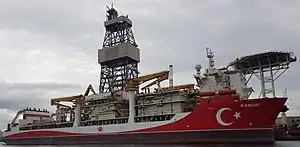
In Turkey, tax levied on diesel is lower than that on petrol, and it has been suggested by the Istanbul International Centre for Energy and Climate at Sabancı University that taxes on diesel and petrol should be more-closely aligned with each other to minimise imports, because Turkey has enough petrol-refining capacity.[75] Exploration for gas in the Eastern Mediterranean is subsidised,[76][77] and is a cause of geopolitical tension because of the Cyprus dispute.[78]
In 2022 the Turkish Energy Minister said Turkey and Algeria would create a joint oil-and-gas-exploration company.[79]
Geopolitics
In 2019, the European Council objected to the Turkish drilling activities in the eastern Mediterranean.[80]
Unlike several European countries, which stopped buying oil and gas from Russia or were cut off after the 2022 Russian invasion of Ukraine, relations with Russia are such Turkey continues to buy both commodities from Russia.[8][9] Turkey can consume discounted Russian diesel, and also buys discounted Russian crude, which it refines and sells legally as of 2022[lower-alpha 2] as Turkish at the global price.[81] For example, Shell and Vitol are claimed to have done this with SOCAR and Tüpraş, although there is no proof the purchased products were refined from Russian crude.[82] Crude from different countries is often blended at refineries so as of 2023, it is not possible to tell where a barrel of diesel originated from; NGO Global Witness said the EU should ban products from refineries that refine Russian crude.[83]
It is sometimes difficult for media in Turkey to fully report on energy geopolitics.[84] Turkey's President Recep Tayyip Erdoğan said in 2022 Turkey could not join sanctions on Russia because of import dependency.[85] TPAO hopes to explore for oil and gas in Libyan waters,[86] and a memorandum of understanding has been agreed with the Libyan government.
The two main political parties in Northern Iraq the Patriotic Union of Kurdistan (PUK) and Kurdistan Democratic Party (KDP) would have to agree for a new pipeline to take the shortest route because oil would come from wells in the PUK-controlled area and pass through a KDP-controlled area.[87] In 2022, the Iranian Islamic Revolutionary Guard Corps struck to stop a new pipeline.[88][89]
In 2023, the International Court of Arbitration ruled Turkey could not import from Iraqi Kurdistan without the consent of the Iraqi central government.[90] Sales from Iraq have been affected by discounted Russian crude.[91]
Reducing fossil fuel share of energy
Turkey intends to increase the share of renewables and nuclear power in the national energy mix.[92] According to a May 2022 report from think tank Ember, wind power and solar power saved Turkey seven billion dollars on gas imports in the preceding 12 months.[93] It is hoped further electrification, of sectors such as road transport[94] will reduce Turkey's dependency on imported oil.
History
During the early 20th century, the Ottoman Empire granted a concession allowing William Knox D'Arcy to explore oil fields in its territories which, after the dissolution of the Ottoman Empire, became the modern countries Turkey and Iraq. In 1912, D'Arcy and other European partners founded the Turkish Petroleum Company, which was later renamed the Iraq Petroleum Company.[95][96][97]
In late Ottoman times, permission to explore for oil in the İskenderun area was granted to the Grand Vizier Kamil Pasha and later to Ahmet Necati Bey.[21] With the fall of the Ottoman Empire, oil and gas fields in Mosul vilayet—of which Kirkuk was a part—were lost and since then, Turkey has had to rely on imports.[98] In 1926, the Turkish government took over oil exploration rights.[21] In 2001 natural gas was legally separated from oil.[21] The General Directorate of Mineral Research and Exploration was formed.[21] The first oil imports from Russia arrived in 1986 and from Azerbaijan in 2007.[99]
Between 2000 and 2020, Turkey's share of imported energy increased from just over 50% to 70%.[100] In 2022, Turkey's oil consumption decreased due to the COVID-19 pandemic and resulting travel restrictions.[13]: 19 Also in 2022, Middle Eastern crude imports were displaced by imports of discounted Russian crude, which tripled in the period from before the Ukraine invasion to 1 January 2023.[91]
Notes
References
- ↑ IEA (March 2021). Turkey 2021 – Energy Policy Review (Technical report). International Energy Agency. Archived from the original on 7 March 2022. Retrieved 19 December 2021.
- ↑ "Energy consumption by source, Turkey". Our World in Data. Archived from the original on 1 April 2023. Retrieved 2 August 2022.
- 1 2 3 "Oil and Gas – Turkey". International Trade Administration, U.S. Department of Commerce. Archived from the original on 28 February 2023. Retrieved 2 August 2022.
- ↑ Adal, Hikmet (25 February 2022). "Russia-Ukraine war: How will it affect Turkey's economy?". Bianet. Archived from the original on 25 February 2022. Retrieved 4 March 2022.
- 1 2 DifiglioGürayMerdan (2020), pp. 203.
- 1 2 DifiglioGürayMerdan (2020), pp. 206.
- ↑ "Turkey's current account deficit at $4.1 bln in November; $48 billion in 2022". Reuters. 6 January 2023. Archived from the original on 8 January 2023. Retrieved 8 January 2023.
- 1 2 Bakheit, Nesreen; Imahashi, Rurika (9 June 2022). "China, India and Turkey to siphon more Russian oil ahead of EU ban". Nikkei Asia. Archived from the original on 9 March 2023. Retrieved 7 July 2022.
- 1 2 Dezem, Vanessa (28 June 2022). "EU Gas Swings as Russia-Turkey Flows Resume While Risks Loom – BNN Bloomberg". BNN Bloomberg. Archived from the original on 28 February 2023. Retrieved 7 July 2022.
- ↑ DifiglioGürayMerdan (2020), p. 205.
- ↑ DifiglioGürayMerdan (2020), p. 212.
- ↑ "Turkey plans to create domestic car with electric engine". Azernews. 23 March 2019. Archived from the original on 27 March 2019. Retrieved 27 March 2019.
- 1 2 3 4 5 2022 energy outlook (PDF) (Report). Industrial Development Bank of Turkey. December 2022. Archived (PDF) from the original on 20 April 2023. Retrieved 28 February 2023.
- ↑ Efe, Bahtiyar (7 March 2022). "Air quality improvement and its relation to mobility during COVID-19 lockdown in Marmara Region, Turkey". Environmental Monitoring and Assessment. 194 (4): 255. doi:10.1007/s10661-022-09889-7. ISSN 1573-2959. PMC 8900962. PMID 35257238. Archived from the original on 30 October 2023. Retrieved 28 February 2023.
There is a significant relationship between mobility decrease and NO2 concentrations in large cities.
- ↑ Demir, Tuğçe; Karakaş, Duran; Yenisoy-Karakaş, Serpil (1 March 2022). "Source identification of exhaust and non-exhaust traffic emissions through the elemental carbon fractions and Positive Matrix Factorization method". Environmental Research. 204 (Pt D): 112399. Bibcode:2022ER....204k2399D. doi:10.1016/j.envres.2021.112399. ISSN 0013-9351. PMID 34800531. S2CID 244367106. Archived from the original on 30 October 2023. Retrieved 28 February 2023.
- ↑ "Analysing shipping emissions of Turkish ports in the Black Sea and investigating their contributions to Black Sea emissions". Archived from the original on 16 May 2022. Retrieved 28 February 2023.
- ↑ Ekmekçioğlu, Araks; Ünlügençoğlu, Kaan; Buğra Çelebi, Uğur (December 2019). "Ship Emission estimation for Izmir and Mersin international Ports – Turkey". Archived from the original on 8 June 2021. Retrieved 21 May 2023.
- ↑ Harvey, Fiona (23 February 2022). "Oil and gas facilities could profit from plugging methane leaks, IEA says". The Guardian. Archived from the original on 2 June 2022. Retrieved 2 June 2022.
- ↑ "How do countries measure greenhouse gas emissions?". UNEP. 13 September 2022. Archived from the original on 16 April 2023. Retrieved 23 May 2023.
Countries report their emissions through what is known as a 'bottom up' approach, where national emissions are estimated by combining data on types of activity with the emissions typically produced by those activities.
- 1 2 "Crude Oil". Ministry of Energy and Natural Resources. Archived from the original on 17 August 2022. Retrieved 2 August 2022.
- 1 2 3 4 5 "Oil Production in Turkey". Petform. Archived from the original on 31 May 2023. Retrieved 7 July 2022.
- ↑ "Turkey's oil imports up 42.4 percent in December 2021". Hürriyet Daily News. 24 February 2022. Archived from the original on 17 March 2022. Retrieved 14 July 2022.
- ↑ TURKISH PETROLEUM MARKET REPORT 2021 (Report). EMRA. Archived from the original on 30 October 2023. Retrieved 28 February 2023.
- ↑ "Turkey". U.S. Energy Information Administration. Archived from the original on 9 December 2022. Retrieved 9 December 2022.
- ↑ DifiglioGürayMerdan (2020), p. 223.
- ↑ Charles, Kennedy (4 May 2023). "Turkey Makes Huge 1-Billion-Barrel Oil Discovery". OilPrice. Archived from the original on 21 May 2023. Retrieved 21 May 2023.
- ↑ DifiglioGürayMerdan (2020), pp. 226.
- ↑ Consultancy, Pi Legal (28 February 2023). "Oil Market Activities in Turkey". Pi Legal Consultancy. Archived from the original on 20 March 2023. Retrieved 20 March 2023.
- ↑ DifiglioGürayMerdan (2020), pp. 198.
- ↑ Safran, S. Esra; Kok, Mustafa Versan (1 January 2022). "Nanoparticle-stabilized CO2 foam to improve conventional CO2 EOR process and recovery at Batı Raman oil field, Turkey". Journal of Petroleum Science and Engineering. 208: 109547. Bibcode:2022JPSE..20809547S. doi:10.1016/j.petrol.2021.109547. ISSN 0920-4105. S2CID 240510969. Archived from the original on 8 January 2023. Retrieved 28 February 2023.
- ↑ DifiglioGürayMerdan (2020), pp. 199–200.
- ↑ "Turkey – Oil and Gas". US EIA. Archived from the original on 28 February 2023. Retrieved 28 February 2023.
- ↑ DifiglioGürayMerdan (2020), pp. 201.
- ↑ "Russia's Feb diesel exports to Turkey hit record high -traders, Refinitiv data | Hellenic Shipping News Worldwide". www.hellenicshippingnews.com. Archived from the original on 28 March 2023. Retrieved 24 May 2023.
- ↑ Conte, Niccolo (1 March 2023). "The Countries Buying Russian Fossil Fuels Since the Invasion". Elements by Visual Capitalist. Archived from the original on 29 May 2023. Retrieved 24 May 2023.
- ↑ "Turkey". United States Energy Information Administration. Archived from the original on 9 August 2022. Retrieved 20 June 2022.
- ↑ "Turkey". International Tanker Owners Pollution Federation Ltd. (ITOPF). Archived from the original on 4 May 2022. Retrieved 20 June 2022.
- ↑ "Turkish Tanker Move Adds Teeth to EU Sanctions on Russia Oil". Bloomberg.com. 17 November 2022. Archived from the original on 18 November 2022. Retrieved 28 February 2023.
- ↑ "Investor's Guide For Natural Gas". Archived from the original on 7 March 2023. Retrieved 28 February 2023.
- ↑ "Financing Putin's war: Fossil fuel exports from Russia in the first six months of the invasion of Ukraine". Centre for Research on Energy and Clean Air. 6 September 2022. Archived from the original on 4 December 2022. Retrieved 8 December 2022.
- ↑ "Turkey Becomes New Route for Russian Oil to EU – Think Tank". 16 November 2022. Archived from the original on 10 March 2023. Retrieved 28 February 2023.
- ↑ Edwards, Rowena (7 December 2022). "Explainer: Europe set to import banned Russian diesel without knowing". Reuters. Archived from the original on 12 January 2023. Retrieved 9 January 2023.
- ↑ "Turkey is guzzling Russian diesel that Europe can't buy". Archived from the original on 24 May 2023. Retrieved 24 May 2023.
- ↑ "Russian crude oil tracker". Bruegel. Archived from the original on 8 December 2022. Retrieved 8 December 2022.
- ↑ "BlackSeaNews | Russia's crude oil exports from the Black Sea in April–October 2022 (2)". BlackSeaNews. Archived from the original on 7 December 2022. Retrieved 8 December 2022.
- ↑ Edwards, Rowena; Payne, Julia (8 December 2022). "Azerbaijan's SOCAR halts Russian crude supplies to Turkish refinery". Reuters. Archived from the original on 18 March 2023. Retrieved 9 December 2022.
- ↑ "Turkey and Morocco Are Emerging as Demand Sources for Russian Diesel Before EU Ban". Bloomberg.com. 31 January 2023. Archived from the original on 2 February 2023. Retrieved 1 February 2023.
- ↑ "Turkey Is Guzzling Russian Diesel That Europe Can't Buy". Bloomberg.com. 4 April 2023. Archived from the original on 30 October 2023. Retrieved 7 May 2023.
- ↑ "Archived copy". Archived from the original on 20 March 2023. Retrieved 20 March 2023.
{{cite web}}: CS1 maint: archived copy as title (link) - ↑ Fraser, Suzan (2 October 2020). "What lies behind Turkish support for Azerbaijan". Associated Press. Archived from the original on 6 October 2020. Retrieved 22 May 2021.
- ↑ O'Byrne, David (23 October 2018). "Turkey and Azerbaijan cement relations with new oil refinery". Eurasianet. Archived from the original on 22 May 2021. Retrieved 22 May 2021.
- ↑ "Kazakhstan's First Batch of Oil through BTC Pipeline Shipped from Turkey's Ceyhan Port | Pipeline Technology Journal". www.pipeline-journal.net. Archived from the original on 19 May 2023. Retrieved 19 May 2023.
- ↑ "SOCAR opens Turkish refining complex". Oil and Gas journal. 25 October 2018. Archived from the original on 30 October 2023. Retrieved 4 July 2022.
- ↑ Turner, Elza (26 July 2022). "S&P Global Commodity Insights". S & P Global. Archived from the original on 26 July 2022. Retrieved 26 July 2022.
- ↑ "2021 annual report" (PDF). Türkiye Petrol Rafinerileri A.Ş. Archived (PDF) from the original on 5 June 2022. Retrieved 28 February 2023.
- ↑ DifiglioGürayMerdan (2020), p. 238.
- ↑ "Renewables projects in Europe". Hellenic Shipping News. 27 July 2022. Archived from the original on 20 September 2022. Retrieved 17 September 2022.
- ↑ "IMO 2020 – cutting sulphur oxide emissions: Mediterranean ECA Will Lead to a 77% Drop in Sox Emissions From Ships". Hellenic Shipping News. 12 September 2022. Archived from the original on 20 September 2022. Retrieved 17 September 2022.
- 1 2 "Turkey May Soon Return as Big Buyer of Russian Oil". Energy Intelligence. 23 December 2022. Archived from the original on 31 December 2022. Retrieved 31 December 2022.
- ↑ "Petroleum Istanbul 2023". PetrolPlaza. Archived from the original on 29 December 2022. Retrieved 29 December 2022.
- ↑ "AYLIK PETROL BÜLTENİ ARALIK 2022" (PDF). p. 2. Archived (PDF) from the original on 7 May 2023. Retrieved 7 May 2023.
- ↑ "Road Motor Vehicles, December 2022". Turkstat. Archived from the original on 7 May 2023. Retrieved 7 May 2023.
- ↑ "USA gasoline prices, 19-Jun-2023". GlobalPetrolPrices.com. Archived from the original on 26 June 2023. Retrieved 26 June 2023.
- ↑ "Current fuel prices". Turkish Petroleum. Archived from the original on 26 June 2023. Retrieved 26 June 2023.
- ↑ "Turkey to stabilize consumer fuel tax with new rule". www.aa.com.tr. Archived from the original on 26 June 2023. Retrieved 26 June 2023.
- ↑ "🇹🇷 JP54, price in Turkey 86.4 bbl/$ [26.06.2023]". jet-a1-fuel.com. Archived from the original on 26 June 2023. Retrieved 26 June 2023.
- ↑ "Turkey Jet fuel consumption – data, chart". TheGlobalEconomy.com. Archived from the original on 26 June 2023. Retrieved 26 June 2023.
- ↑ Jordan, Jack. "Turkish Supplier CYE Petrol in Restructuring Process". Ship & Bunker. Archived from the original on 26 June 2023. Retrieved 26 June 2023.
- ↑ Wallace, Joe (29 November 2021). "Turkey's Lira Crisis Exposes Reliance on Imported Energy". Wall Street Journal. ISSN 0099-9660. Archived from the original on 19 December 2021. Retrieved 19 December 2021.
- ↑ Aka, Kemal (July 2020). "The effect of Oil Prices on Economic Growth, Inflation and Stock Market: an application on Turkey Economy". Archived from the original on 24 May 2023. Retrieved 24 May 2023.
- ↑ "Exclusive: Urals oil supplies to Turkey jump in Feb as STAR refinery resumes Russian crude imports". Reuters. 1 March 2023. Archived from the original on 20 March 2023. Retrieved 20 March 2023.
- ↑ Kardaś, Szymon (4 May 2023). "Keeping the lights on: The EU's energy relationships since Russia's invasion of Ukraine". ECFR. Archived from the original on 20 May 2023. Retrieved 20 May 2023.
- ↑ Dixon, Hugo (27 February 2023). "Breakingviews – A post-Erdogan Turkey could come in from the cold". Reuters. Archived from the original on 19 March 2023. Retrieved 20 March 2023.
- ↑ Kulovic, Nermina (14 September 2020). "Turkey bringing in another drillship for Black Sea ops". Offshore Energy. Archived from the original on 20 September 2022. Retrieved 18 September 2022.
- ↑ DifiglioGürayMerdan (2020), p. 202.
- ↑ "Turkey to continue gas drilling work around Cyprus: Foreign minister". Anadolu Agency. 16 October 2018. Archived from the original on 22 January 2020. Retrieved 11 January 2021.
- ↑ "Fossil Fuel Support – TUR" Archived 31 August 2019 at the Wayback Machine, OECD, accessed August 2018.
- ↑ Lawless, Ghislaine (24 February 2020). "What lies beneath: gas-pricing disputes and recent events in Southern Europe". Arbitration Blog. Archived from the original on 8 August 2020. Retrieved 9 March 2020.
- ↑ "Turkey eyes risky energy partnership with Algeria – Al-Monitor: Independent, trusted coverage of the Middle East". www.al-monitor.com. 15 November 2022. Archived from the original on 29 December 2022. Retrieved 29 December 2022.
- ↑ "Turkish drilling activities in the Eastern Mediterranean: Council adopts conclusions". Council of the European Union. 15 July 2019. Archived from the original on 12 May 2023. Retrieved 24 May 2019.
- ↑ Cohen, Patricia (9 December 2022). "Turkey Is Strengthening Its Energy Ties With Russia". The New York Times. ISSN 0362-4331. Archived from the original on 14 December 2022. Retrieved 14 December 2022.
- ↑ Lawson, Alex; correspondent, Alex Lawson Energy (19 February 2023). "Shell and Vitol accused of prolonging Ukraine war with sanctions 'loophole'". The Guardian. ISSN 0261-3077. Archived from the original on 20 February 2023. Retrieved 20 February 2023.
- ↑ "Shell & Vitol bring Russian-origin diesel into Europe, despite swearing off Russian oil". Global Witness. Archived from the original on 20 February 2023. Retrieved 20 February 2023.
- ↑ "Turkey, Russia gas ties grow contentious amid Ukraine war". Al-Monitor. 28 July 2022. Archived from the original on 28 February 2023. Retrieved 4 August 2022.
- ↑ "Russia Ukraine conflict: France raises Russian sanctions-busting with Turkey". Al Arabiya. 6 September 2022. Archived from the original on 28 February 2023. Retrieved 28 February 2023.
- ↑ Gupte, Eklavya (10 October 2022). "Libya-Turkey exploration deal to fuel long-standing political, regional rivalries". www.spglobal.com. Archived from the original on 29 June 2023. Retrieved 11 October 2022.
- ↑ Ismail, Amina; Dahan, Maha El (13 June 2022). "Analysis: Kurdish tensions stymie Iraqi region's gas export ambitions". Reuters. Archived from the original on 6 December 2022. Retrieved 14 October 2022.
- ↑ "Iran File: Iran and Turkey face off in Iraq". Critical Threats. Archived from the original on 15 October 2022. Retrieved 14 October 2022.
- ↑ Wilkenfeld, Yoni (14 June 2022). "Iraq at a crossroads: Kurdish energy competition with Iran". GIS Reports. Archived from the original on 29 May 2023. Retrieved 14 October 2022.
- ↑ "Iraq wins landmark case against Turkey over Kurdish oil exports". Financial Times. 25 March 2023. Archived from the original on 25 March 2023. Retrieved 26 March 2023.
- 1 2 "The EU Ban on Russian Oil: Crude Implications for the Middle East". Center on Global Energy Policy at Columbia University | SIPA. 15 February 2023. Archived from the original on 20 March 2023. Retrieved 20 March 2023.
- ↑ "Türki̇ye's International Energy Strategy / Republic of Türkiye Ministry of Foreign Affairs". www.mfa.gov.tr. Archived from the original on 19 September 2012. Retrieved 3 February 2023.
- ↑ "Turkey: Wind and solar saved $7 bn in 12 months". Ember. 24 May 2022. Archived from the original on 24 May 2022. Retrieved 26 May 2022.
- ↑ Field, Kyle (5 May 2022). "Turkey Launches Its First Homegrown Automotive Company & It's Electric!". CleanTechnica. Archived from the original on 7 July 2022. Retrieved 7 July 2022.
- ↑ ILEI-Oil-and-Gas-Law.pdf (PDF), archived (PDF) from the original on 25 March 2020, retrieved 12 June 2018
- ↑ J. Zedalis, Rex (September 2009). The Legal Dimensions of Oil and Gas in Iraq | Current Reality and Future Prospects. Cambridge University Press. p. 360. ISBN 9780521766616. Archived from the original on 15 July 2021. Retrieved 28 February 2023.
- ↑ "IPC – History and early development". Archived from the original on 1 September 2014. Retrieved 22 August 2012.
- ↑ Karataş, Abdullah (28 June 2022). "The geopolitics of Turkish inflation". Anadolu Agency. Archived from the original on 28 February 2023. Retrieved 28 February 2023.
- ↑ Kanapiyanova, Zhuldyz. "Turkey-Russia Energy Cooperation on Natural Gas". Eurasian Research Institute. Archived from the original on 28 February 2023. Retrieved 20 April 2022.
- ↑ "Turkey is faced with a serious energy crisis, says engineers chamber". Bianet. 7 February 2022. Archived from the original on 20 September 2022. Retrieved 28 February 2023.
Sources
- Difiglio, Prof. Carmine; Güray, Bora Şekip; Merdan, Ersin (November 2020). Turkey Energy Outlook. iicec.sabanciuniv.edu (Report). Sabanci University Istanbul International Center for Energy and Climate (IICEC). ISBN 978-605-70031-9-5.
